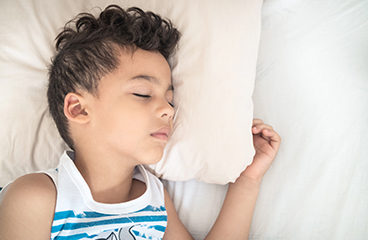
What is a sleep study?
Sleep studies are tests to watch what happens to your child's body during sleep. These studies usually are done in a sleep lab. Sleep labs are often located in hospitals. But these studies may sometimes be done with portable equipment that your child can use at home.
Why is this test done?
Sleep studies are done to learn more about your child's sleep problems, such as sleep apnea or excessive snoring. They may also be done if your child has repeated muscle twitching of the feet, arms, or legs during sleep.
How do you prepare for the test?
- You may be asked to keep a sleep diary for your child before the test.
- Avoid or limit the amount of naps your child takes on the day of the test.
- Your child may be asked to avoid food or drinks with caffeine before the test.
- If the sleep study will be done in a sleep lab, have your child take a shower or bath before the test. Don't use sprays, oils, or gels on your child's hair. Your child should not wear makeup, fingernail polish, or fake nails. Take a small overnight bag with personal items, such as a toothbrush, a comb, favorite pillows or blankets, and a book. Your child can wear their own nightclothes.
- You may be expected to stay with your child overnight. The staff at the sleep center will give you more details on how you can help your child with the study.
- If your child will have portable sleep monitoring, your doctor will explain how to use the equipment at home.
How is the test done?
- In the sleep lab, your child will be in a private room. It's much like a hotel room.
- Small pads or patches called electrodes will be placed on your child's head and body with a small amount of glue and tape. These will record things like brain activity, eye movement, oxygen levels, and snoring.
- Soft elastic belts will be placed around your child's chest and belly. They measure breathing.
- Your child's blood oxygen levels will be checked by a small clip (oximeter). This clip is placed either on the tip of the index finger or on the earlobe.
- If your child has sleep apnea, your child may wear a mask that's connected to a continuous positive airway pressure (CPAP) machine.
- Your child may be allowed to sleep through the night. Or your child might be awakened now and then and asked to stay awake for a while. It depends on the type of test your child has.
- If your child has portable sleep monitoring, follow the instructions your doctor gave you.
How long does the test take?
Your child will stay in the sleep lab overnight. For some tests, your child will also stay part of the next day.
What happens after the test?
Your child will be able to go home right away. Your child may not have slept well during the test and may be tired the next day. Your child can go back to their usual activities right away.
Follow-up care is a key part of your child's treatment and safety. Be sure to make and go to all appointments, and call your doctor if your child is having problems. Ask your doctor when you can expect to have your child's test results.
Where can you learn more?
Go to http://www.healthwise.net/patientEd
Enter S445 in the search box to learn more about "Sleep Studies: About Your Child's Test".
Current as of: July 10, 2023
Author: Healthwise Staff
Clinical Review Board
All Healthwise education is reviewed by a team that includes physicians, nurses, advanced practitioners, registered dieticians, and other healthcare professionals.

